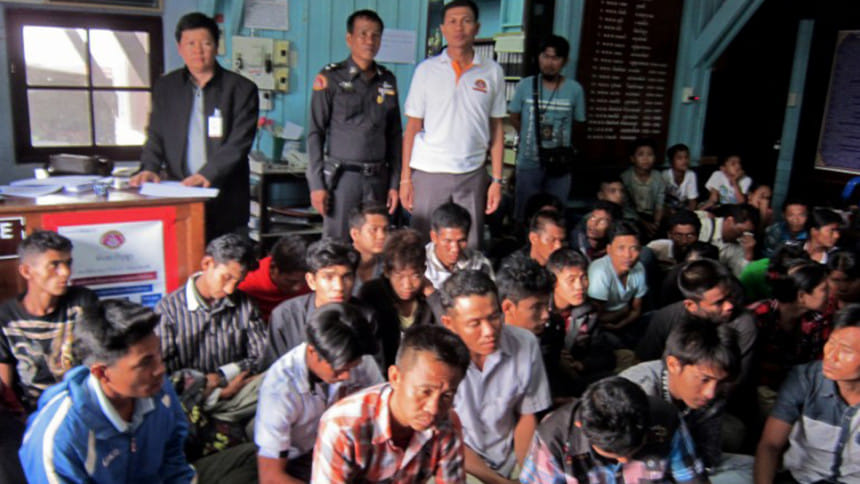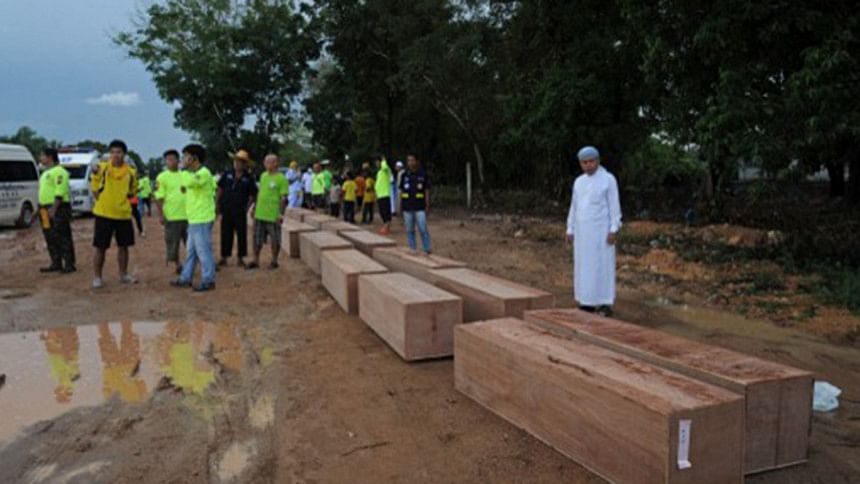Rohingya: Malaysia has slave camps too

After the discovery of “death camps” in southern Thailand, reports are now trickling in that there may be similar slave camps housing illegal immigrants on the Malaysian side of the border.
The former president of the Rohingya club in Thailand involved in helping refugees, Abdul Kalam, alleged that Malaysia is home to some 80 percent of the holding camps where young Rohingya and Bangladeshi “slaves” brought in by human traffickers are kept.
Malaysians are also directly involved in the trafficking syndicate, he alleged yesterday.
Abdul Kalam, who works with Thai police as a translator when Myanmar refugees are rescued, said the slave trafficking camps near the Thai border typically house between 500 and 1,000 people.
“The situation has worsened in the last 10 years, with about 50 camps near the border.
“There are more camps in Malaysia now as the Thai government has been clamping down on human traffickers,” Abdul Kalam, 58, alleged.
He said refugees in these camps were forced to live in deplorable conditions, with little food and drink.
While not making specific accusations against Malaysia, Thailand’s 4th Army Region commander Lt-Gen Prakan Cholayuth said his government was “hoping that neighbouring countries will help in the crackdown of human trafficking activities across the border”.
Kedah police chief Senior Deputy Comm Datuk Zamri Yahya, however, has refuted allegations that such camps exist on the Malaysian side of the border.
“There’s no such thing. As far as we know the camps are only at the Thailand side.
“On the Malaysian side, police, including the Border Intelligence Unit, the General Operations Force, special teams from Bukit Aman and other enforcement agencies are working together to curb illegal immigrants and human trafficking activities,” he said.
Thailand Prime Minister Prayut Chan-o-cha plans to meet Malaysian and Myanmar leaders over the problem.
“Human trafficking has to be jointly tackled and it should be understood that the problem did not originate in Thailand,” he said, adding the country was just a transit point.
Prayut said migrants arrested in Thailand would be taken care of.
“They will be charged with illegal entry. After that, they will be detained, not jailed.”
Over the last few days, Thai authorities have discovered abandoned jungle camps in Songkhla where mass graves have been found.
Dozens of bodies were exhumed in one site while 26 bodies were found in shallow graves a kilometre away.

Abdul Kalam said yesterday he believed that Malaysians were directly involved in the human trafficking syndicate on the Thai side of the border.
“Several refugees who have spent time at these camps have heard conversations taking place in Bahasa Malaysia.
“I have told my people in Myanmar not to come to Malaysia because they may be kidnapped and beaten by human traffickers, but they don’t believe me,” he said.
Abdul Kalam, who has been living in Thailand for more than 30 years, said his fellow nationals were lured by human traffickers with promises of good jobs, but were instead sent to hilltop camps.
“They come by boat, about 500 people crammed into one boat.
“They charge each person RM7,000, which they have to pay once they start working.
“But they get cheated. Traffickers send them to camps and ask for ransom from their families,” he told The Star.
Speaking in fluent Thai and some broken English, he revealed that those who did not pay up or attempted to run away would be beaten, some to death.
“Once money is paid or when someone is willing to ‘buy’ the Rohingya, they’ll be sent to Malaysia.
“Over there, people wait in a car to pick up the refugees,” he said.
The Star/Asia News Network.

 For all latest news, follow The Daily Star's Google News channel.
For all latest news, follow The Daily Star's Google News channel. 



Comments